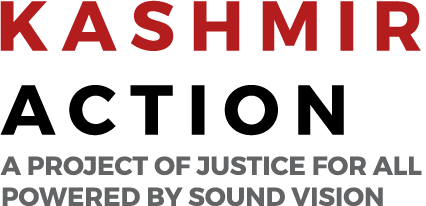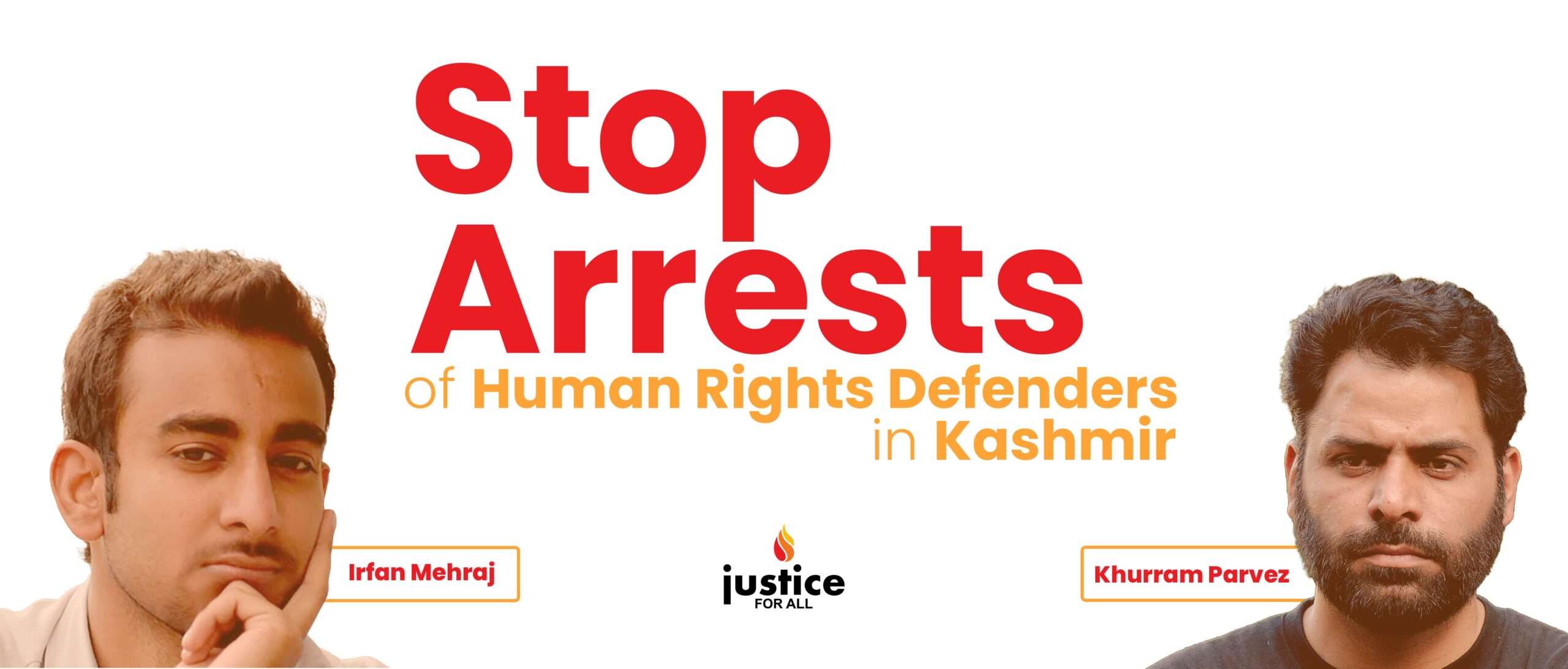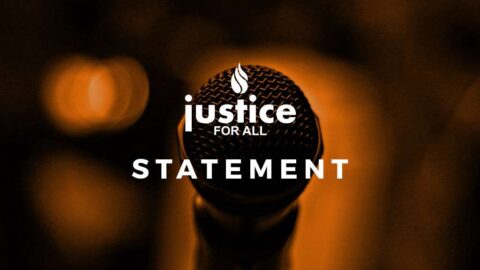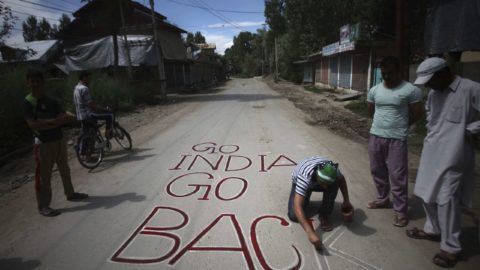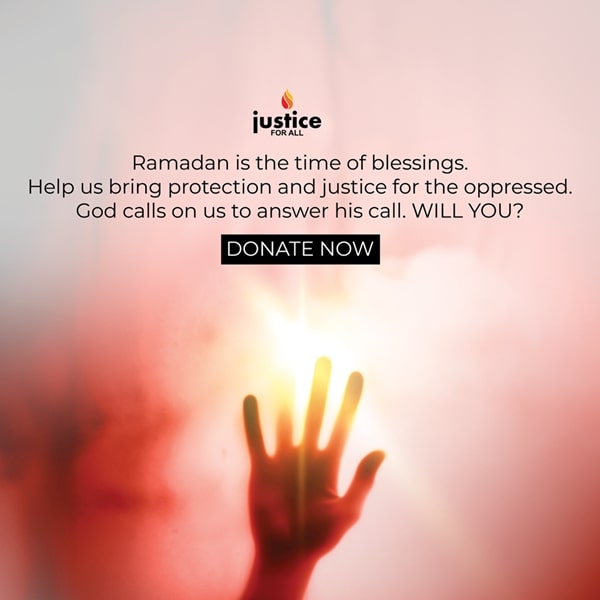Justice For All Statement on Torture and Extrajudicial Killings in Kashmir February 18, 2025 Justice…
Statement of Kashmir Scholars Network on Arrests of Human Rights Defenders in Kashmir
Kashmir Scholars Consultative and Action Network
Stop Arrests of Human Rights Defenders in Kashmir
Public Statement on the Arrests of Irfan Mehraj and Khurram Parvez
April 1, 2023
As Kashmir scholars, we submit this statement to express our deep concern over the Government of India’s intensified repression of human rights work in the disputed region of Indian-Administered Jammu & Kashmir (IAJK) targeting the Jammu and Kashmir Coalition of Civil Society (JKCCS) through the arrest of Irfan Mehraj and the second arrest of Khurram Parvez in a terror-related case. Both of these arrests have taken place in connection with a First Information Report (FIR), RC-37/2020/NIA/DLI, filed by the agency in October 2020 in New Delhi under the draconian Unlawful Activities (Prevention) Act (UAPA) and the Indian Penal Code. These arrests epitomize the Government of India’s strategy of criminalizing journalists and defenders of human rights with the aim of silencing and terrorizing all voices that document the legal and political realities of Kashmir.
On March 20, 2023, Irfan Mehraj was summoned while covering a story on professional assignment and subsequently arrested by the National Investigation Agency (NIA), India’s central counter-terrorist task force. Irfan Mehraj is a Srinagar-based freelance journalist who previously worked as a JKCCS researcher. The founding editor of Wande Magazine and a senior editor at TwoCircles.net, he has contributed to leading news publications like The Indian Express, Al Jazeera, Himal Southasian, Deutsche Welle (DW), and TRT World. He joins Kashmiri journalists Fahad Shah, Aasif Sultan, and Sajad Gul, among others, who have been detained for writing and reporting on Kashmir. Following his arrest, the NIA issued a press release identifying him as “a close associate of Khurram Parvez.”
Khurram Parvez is the JKCCS Program Coordinator who is already incarcerated in a separate terror-related case – FIR RC-30/2021/NIA/DLI – since November 2021, with the chargesheet filed in May 2022. His name has now been added to the case with Irfan Mehraj. Khurram Parvez’s work as a human rights defender has been globally acknowledged, and he is the recipient of several international awards honoring his untiring work.
The current case targets JKCCS as a human rights organization. On March 21, 2023, an NIA spokesman stated that “JKCCS was funding terror activities in the valley and had also been in the propagation of a secessionist agenda in the Valley under the garb of protection of human rights” [emphasis added]. The 2020 FIR casts a wide net of allegations, stating that “NGOs, Trusts and Societies, registered as well as un-registered, are collecting funds domestically and abroad through donations, business contributions etc. in the name of charity and various welfare activities such as public health, education etc. Some of these NGOs have links with proscribed terrorist organisation [sic].” It also explicitly criminalizes, under counter-terror law, human rights documentation and reporting by stating that “these NGOs, Trusts and Societies and their members, by words and written means, publish anti-national and incriminating material to bring into hatred, contempt and disaffection towards the Government of India.” This 2020 FIR has provided the basis for prolonged and ongoing interrogations of journalists, associates, and researchers; other human rights defenders may also be arrested in this case in the near future.
Over the past week, nationalist media platforms have amplified the state’s narrative locating JKCCS at the heart of a global “separatist intellectual ecosystem” and “separatist-terrorist ecosystem” that includes UN officials, international human rights organizations, journalists, and scholars. This exemplifies the Government of India’s long-standing and now escalating pattern of using colonial counter-terrorism laws to intimidate, threaten, and criminalize human rights activists, journalists, scholars and public health, education, and social justice activists. This tactic effectively terrorizes all civil society in Kashmir while labeling resistance groups as “terrorists,” thus outlawing them and any and all association with them. In a press statement on March 24, 2023, UN Special Rapporteur on the situation of human rights defenders, Mary Lawlor, stated: “The Jammu and Kashmir Coalition of Civil Society (JKCCS) carries out essential work monitoring human rights. Their research and analysis of human rights violations are of huge value, including to international organisations seeking to ensure accountability and non-repetition of abuses.”
As Kashmir scholars, we emphasize that JKCCS has always operated as an internationally respected human rights documentation center and civil society institution. Over the years, they have published several critically important human rights reports including Buried Evidence (2009), Alleged Perpetrators (December 2012), Structures of Violence (September 2015), Torture (May 2019), and Kashmir’s Internet Siege (August 2020), among others, that have rigorously and meticulously documented India’s ongoing human rights violations in Kashmir. JKCCS reports are based on methodologically conscientious field research and scrupulous data collection practices. They meet the highest standards of research and scholarship. This comprehensive documentation has been extensively cited in the academic work of many scholars researching and writing on Kashmir, including those in KSCAN. It has immense value for those monitoring and reporting on human rights in India, for example, the UN Office of the High Commissioner for Human Rights (OHCHR), the European Parliament Subcommittee on Human Rights (DROI), the US State Department, and the UN Special Procedures mandates comprising independent experts. Over the past decade, JKCCS research and its documentation has acquired even greater significance due to India’s escalation of press censorship and refusal of access to scholars and human rights monitors, including the UN Special Rapporteurs, to Kashmir.
The silencing in Kashmir has reached an unprecedented dimension since 2019 following the illegal annexation of IAJK in clear violation of international law. The Government of India has increasingly criminalized and limited all forms of expression – journalistic, academic, legal, photographic, and via social media. India has fallen to 150 (out of 180) in the World Press Freedom Index (2022), an annual ranking by the non-profit Reporters Without Borders – its lowest ranking ever. There is constant illegal surveillance of online platforms and a new and strikingly draconian media policy in Jammu & Kashmir since June 2020, such that nearly all news media have been reduced to mere mouth pieces for the Government. The fear of incarceration is all too real for activists and journalists, especially those from Kashmir.
KSCAN urgently requests all organizations and individuals of conscience to join Amnesty International, Observatory for the Protection of Human Rights (OMCT and FIDH), Human Rights Watch, Frontline Defenders, People’s Union for Democratic Rights, Journalist Federation of Kashmir, All India Lawyers’ Association for Justice, Press Club of India, and Human Rights Watch in urgently calling for the immediate release of Irfan Mehraj and Khurram Parvez, as well as incarcerated journalists Fahad Shah, Aasif Sultan and Sajad Gul, among others, and for an immediate end to the criminalization of human rights documentation, journalism, and research in Kashmir.
The Kashmir Scholars Consultative and Advocacy Network is an interdisciplinary group of scholars of various nationalities engaged in research on the region of Kashmir. Our research on the Kashmir conflict addresses its history, its consequences for the region and beyond, and its possible resolution. It examines the implications for an internationally mediated political solution, and is of relevance to policy makers.
Email: kashmirscholarsnetwork@protonmail.com
Website: www.kashmirscholarsnetwork.org
Institutional and Organizational Endorsements of the KSCAN Statement
AGITATE! Journal: Unsettling Knowledges
Asian Federation Against Involuntary Disappearances (AFAD)
Americans for Kashmir
Asian Forum for Human Rights and Development (FORUM-ASIA)
Canadian BDS Coalition
Canadians for Peace and Justice in Kashmir
Center for Cultural Power
Civic Coalition, Jerusalem
Detention Solidarity
Friends of Sabeel of North America (FOSNA)
Hamilton Coalition To Stop The War
Hindus for Human Rights
India Justice Project, Berlin
International Action Center
International Coalition Against Enforced Disappearances
Islamophobia Studies Center
Just Peace Advocates / Mouvement Pour Une Paix Juste
Justice for All
Justice For All Canada
Kashmir Law & Justice Project
Kashmir-Palestine Scholars Solidarity Network
Lausan Collective, Hong Kong
Let Kashmir Decide
Montreal for a World BEYOND War
National Federation of Indian Women
Palestine Action, UK
Palestinian and Jewish Unity (PAJU)
Project South, Atlanta
Quebec Public Interest Research Group at Concordia University, Montreal, Canada
Rafto Foundation for Human Rights
RootsAction Education Fund
Samidoun Palestinian Prisoner Solidarity Network
Socialist Action / Ligue Pour l’Action Socialiste
South Asia Solidarity Group, UK
Stoke White Investigations
University at Buffalo Gender Institute, New York
University at Buffalo Humanities Institute, New York
University Network for Human Rights
World Organization Against Torture (OMCT)
Scholars, Journalists and Activists Signing in Solidarity with the KSCAN Statement
dyuti a, University of Sussex
Rabab Abdulhadi, Director, Arab and Muslim Ethnicities and Diasporas Studies, San Francisco State University
Lila Abu-Lughod, Columbia University
Nadia Abu-Zahra, University of Ottawa
Dean Accardi, Connecticut College
Vaqar Adhami, University of Wisconsin-Madison
Omer Aijazi, University of Victoria and University of British Columbia
Heba Al Adawy, Australian National University
Samar Al-Bulushi, UC Irvine
Gaye-Frances Alexander, Raging Grannies Toronto
Nosheen Ali, New York University
Sharib A. Ali, University of Bern
Ian Almond, Georgetown University in Qatar
Prof. Aman, Jindal Global University
Vivek Anand, Psychotherapist
Ruhail Andrabi, University of California San Diego
Ovamir Anjum, University of Toledo
Mohammad Ashrafuzzaman, Human Rights Defender
Mary Aileen D. Bacalso, International Coalition Against Enforced Disappearances (ICAED)
Paola Bacchetta, University of California, Berkeley
Amit Baishya, University of Oklahoma
Dhruva Balram, Journalist
Subhasis Bandyopadhyay, Indian Institute of Engineering Science and Technology, Shibpur
Jenny Bangham, Queen Mary University of London
Zaki Barzinji, Americans for Kashmir
Hatem Bazian, UC Berkeley and Zaytuna College
Victoria Bernal, University of California, Irvine
Anuradha Bhasin, Journalist
Claire Bidwell, Schoolteacher, Human Rights Activist, and Let Kashmir Decide Founder
Somak Biswas, University of Warwick
Elizabeth Block, Independent Jewish Voices
Conor Bollins, University of East Anglia
Pankaj Butalia, Documentary Filmmaker
Judith Galarza Campos, Fedefam-México
Irina Ceric, University of Windsor Faculty of Law
Angana Chatterji, University of California, Berkeley
Aadita Chaudhury, York University, Toronto, Canada
Dobby Chew, Executive Coordinator, Anti-Death Penalty Asia Network
Sheetal Chhabria, Connecticut College
Mohd Abuzar Choudhary, Independent Journalist
Artemis Christinaki, The University of Manchester
Frances Combs, United Church of Canada Clergy
Liesbeth Corens, Queen Mary University of London
Molly Cunningham, University of Chicago
Dia Da Costa, University of Alberta
Alex Da Costa, University of Alberta
Jamil Dakwar, Adjunct Lecturer, Hunter College and New York University
Huma Dar, Critical Studies Program, California College of the Arts
Basit Dar, University of Ottawa
Riddhi Dastidar, Independent Writer
Vinicius Tavares de Oliveira, Pontifical Catholic University of Minas Gerais, Brazil
Nandini Deo, Lehigh University
Khalil Dewan, Stoke White Investigations (SWI)
Meena Dhanda, International Solidarity for Academic Freedom in India
Gordon Doctorow, Nova Southeastern University
Tara Dorabji, Journalist & Author
Tara Dorabji, Vice President, The Center for Cultural Power
Mariam Durrani, American University
Haley Duschinski, Ohio University
Rebekah Edwards, California College of Arts
Yves Engler, Author
John L. Esposito, Georgetown University
Azad Essa, Middle East Eye
Mohammad Fadel, University of Toronto Faculty of Law
Syed Fai, World Council for Peace & Justice
Joey Faustino, Asian Federation Against Involuntary Disappearances
Sareer Fazili, Attorney At Law
Margaret Ferguson, University of California at Davis
K.J. Brito Fernando, Families of the Disappeared, Sri Lanka
Nancy Gallagher, California Scholars for Academic Freedom
Poulami Somanya Ganguly, Queen Mary University of London
Arijeet Ghosh, Jindal Global Law School, Jindal Global University
Ekabali Ghosh, SOAS, University of London
Sahana Ghosh, Anthropologist
Ozlem Goner, City University of New York
Priyamvada Gopal, University of Cambridge
Rebecca Gould, University of Birmingham
Hans Peter Graf, Fondation pour la Formation des Aînées et Ainés de Genève
Inderpal Grewal, Yale University
Claudine Grisard, Queen Mary University of London
Imtiaz Gul, Writer
Arjun Guneratne, Macalester College
Muna Haddad, Human Rights Lawyer
Joyce Hall, Just Earth
Jason Hannan, University of Winnipeg, Canada
Mohammed Mominul Haque, Peace And Justice Alliance
Omar Shukry Haramy, Kumi Now Network
Javaid Hayat, Independent Analyst and Author
Christopher Helali, Dartmouth College
Cheryl Higashida, University of Colorado, Boulder
Julian Hough, Swansea University
J. Shelby House, Anthropology, University of Washington
Anneeth Kaur Hundle, Assistant Professor of Anthropology and Presidential Chair in Social Sciences to Advance Sikh Studies, University of California, Irvine
Shahla Hussain, St. John’s University
Maria Iorillo, Wisewoman Childbirth Traditions
Mehmood Irfan, PhD Student, Royal Melbourne Institute of Technology
Feyzi Ismail, Goldsmiths, University of London
Leslie James, Queen Mary University of London
Chinnaiah Jangam, Carleton University
Rubina Jasani, University of Manchester
Fernando Javier Loayza Jordán, Yale University
Muhamad Junaid, Massachusetts College of Liberal Arts
Virinder Kalra, University of Warwick
Mohamed Kanji, Medical Doctor
Hafsa Kanjwal, Lafayette College
Caren Kaplan, University of California, Davis
Maria Kasstan, Toronto Raging Grannies Canada
Suvir Kaul, University of Pennsylvania
J. Kēhaulani Kauanui, Wesleyan University
Khushdeep Kaur, Temple University
Nancy Vernon Kelly, Lutheran Pastor
Jennifer Kelly, University of California, Santa Cruz
Hassane Kemmoun, Moroccan Truth and Justice Forum (FMVJ Maroc)
Su’ad Abdul Khabeer, University of Michigan
Sang Kil, San Jose State University
Mandal Kinkar, Research Scholar
David Klein, California State University Northridge
Shweta Krishnan, George Washington University
Elizabeth Lee, Canada Peace Network
Michael Letwin, Former President, Assn. of Legal Aid Attorneys/UAW 2325
John Liss, Lawyer
Jinee Lokaneeta, Professor, Drew University
John Lougheed, Retired Minister, United Church of Canada
Anna Maria Luera, Activist
Nidhi Mahajan, University of California, Santa Cruz
Ershad Mahmud, Analyst
Inshah Malik, New Vision University
Wendy Matsumura, University of California, San Diego
Tim McSorley, Civil Liberties and Human Rights Activist
Alanksha Mehta, Goldsmiths, University of London
Peggy Merz, 1000 Grandmothers for Future Generations
Mercedes Mignone, Madres de Plaza de Mayo Línea Fundadora
Judith Miller, First United Church Ottawa
Imraan Mir, Kashmir Law & Justice Project
shabana mir, American Islamic College
Touseef Mir, University of Bath
Abdulla Moaswes, University of Exeter
Chris Moffat, Queen Mary University of London
Chandra Talpade Mohanty, Syracuse University
Janet Montefiore, University of Kent, Canterbury, U.K.
Patricia Morton, University of California, Riverside
Solange Mouthaan, School of Law, University of Warwick
Ahlam Muhtaseb, California State University, San Bernardino
Farhan Mujahid, Qatar University
Suciwati Munir, Committee Action Solidarity for Munir
Shifa Naeem, Psychiatrist
Ruhan Nagra, University of Utah S.J. Quinney College of Law
Shalini Nair, University of Sussex
Saumya Ranjan Nath, University of Sussex
Vasuki Nesiah, New York University
Renee Nunan-Rappard, Human Rights for All (HR4A)
Melissa O’Donnell, Australian Human Rights Lawyer
Iver Ørstavik, Rafto Foundation for Human Rights
Goldie Osuri, University of Warwick
Tod Overstreet, Activist
Subhajit Pal, Phd Student University at Albany
Cristina Palabay, Karapatan Philippines
David Palumbo-Liu, Stanford University
Idrisa Pandit, Luther College, Wilfrid Laurier University
Niharika Pandit, London School of Economics
Shaista Patel, University of California, San Diego
Shantha D. Pathirana, Activist
Somak Paul, Assistant Professor, California State University
Yusuf Perwez, Alliance of South Asians Taking Action (ASATA)
Sharri Plonski, Queen Mary University of London
Susan Power, Al-Haq
Nicola Pratt, University of Warwick
Abdessamad Qesmi, Islamic Council of New England
Srikrupa Raghunathan, Queen Mary University of London
Amit S. Rai, Dutch Art Institute
Fatima Rajina, Stephen Lawrence Research Centre, De Montfort University
Shivangi Mariam Rajina, The Funambulist
Omar M. Ramahi, University of Waterloo
Ratna Raman, Professor, SVC Delhi University
M. V. Ramana, University of British Columbia, Vancouver
Norma Rantisi, Concordia University
Nagesh Rao, Colgate University
Francesca Recchia, The Polis Project
Zohar Chamberlain Regev, Activist
Rush Rehm, Professor, Theater and Classics, Stanford University
Shams Rehman, JKTV
Cabeiri Robinson, University of Washington
Svend Robinson, Former Canadian MP
Karen Rodman, Just Peace Advocates
Favianna Rodriguez, Artist and Activist
Lisa Rofel, University of California, Santa Cruz
Penny Rosenwasser, City College of San Francisco
Stuart A. Ross, World Beyond War
Aroosa Runga, Columnist
Adelheid Russenberger, Queen Mary University of London
Cassandra Ryan, Toronto Raging Grannies
Sana Saboowala, University of Illinois Urbana-Champaign
Elizabeth Saldana, Princeton University
Rakshi Saleem, Lesley University
Tanroop Sandhu, Queen Mary University of London
Pascale Schild, University of Bern
Mary Scully, Let Kashmir Decide Coalition
Daniel Segal, Pitzer College
Jhuma Sen, Independent Legal Practitioner
Meheli Sen, Rutgers University
Alpa Shah, London School of Economics
Mubeen Shah, CEO Kashmir House Turkey
Nadera Shalhoub-Kevorkian, Visiting, University of California, Los Angeles
Elora Shehabuddin, University of California, Berkeley
Arfat Sheikh, World Kashmir Awareness Forum
Moazzam Sheikh, San Francisco Public Library
Omid Shekari, University of Pittsburgh
Dina M. Siddiqi, New York University
James Silk, Binger Clinical Professor of Human Rights, Yale Law School
Sonny Singh, Musician and Activist
Taveeshi Singh, Syracuse University
Lotika Singha, International Solidarity for Academic Freedom in India
Mohamedou Ould Slahi, Writer and Human Rights Activist
Martin Sökefeld, Ludwig Maximilian University, Munich
Sammitha Sreevathsa, University of California, Riverside
Tarangini Sriraman, Goldsmiths, University of London
Kavita Srivastava, People’s Union for Civil Liberties, India
Ann Stewart, School of Law University of Warwick UK
Debbie Stothard, Alternative ASEAN Network on Burma
Aparna Sundar, Independent Scholar
Mayur Suresh, SOAS University of London
Raja Swamy, University of Tennessee
Sharika Thiranagama, Stanford University
Saranga Ugalmugle, Lawyer and Researcher, University of Windsor
Nishant Upadhyay, University of Colorado, Boulder
Vasanthi Venkatesh, University of Windsor, Faculty of Law
Anthony Vinoth, Human Rights Activist
Neha Vora, Lafayette College
Mirza Waheed, Novelist
Harsha Walia, Author
Roger Waters, Musician and Activist
Regina Weldon, Al Jazeera
CJ Werleman, Byline Times
Jennifer Whitfield, Activist
Howard Winant, University of California, Santa Barbara
Vincent Wong, Assistant Professor, University of Windsor Faculty of Law
Waseem Yaqoob, Queen Mary University of London
Emma Yates, School of History, QMUL
Seema Yousuf, Emory University
Masrat Zahra, Journalist/Research Scholar, University of Michigan
Anam Zakaria, Therapist and Writer
Soraya Zarook, University of California, Riverside
